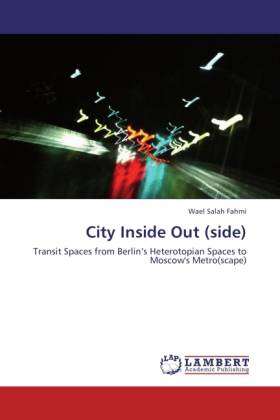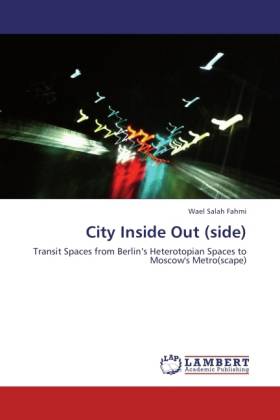
- Afhalen na 1 uur in een winkel met voorraad
- Gratis thuislevering in België vanaf € 30
- Ruim aanbod met 7 miljoen producten
- Afhalen na 1 uur in een winkel met voorraad
- Gratis thuislevering in België vanaf € 30
- Ruim aanbod met 7 miljoen producten
Zoeken
City Inside Out (side)
Transit Spaces from Berlin s Heterotopian Spaces to Moscow's Metro(scape)
Wael Salah Fahmi
Paperback | Engels
€ 48,45
+ 96 punten
Omschrijving
In a territory where non-place and space of flows prevail, a new category of landscape in transit is experienced by users on the move , as they cross in-between boundaries', whilst providing the possibility of a more situational location of the 'urban self' within global mobility. The study proposes a spatio-temporal journey through transit spaces from Berlin's post-GDR Heterotopian Spaces to Moscow's post-Soviet Metro(scape) along West-East Metropolitan Corridor. The cases of Berlin and Moscow are explored in the context of their reconstructed global urban images, whilst shaping local construction of place identity. From the historical erasure of socialist symbols to recent postmodern spatiality, Berlin's Heterotopian Spaces and Moscow's Metro(scape) are experienced as hybrid transit spaces at the frontier of post-socialist transformation. The reinvention of Berlin and Moscow, as World Class Cities and as venues of contested West-East transformation, raises issues of how politics, history, and place making and visioning are interlinked in the spatial constitution and expression of collective memory and cultural identities.
Specificaties
Betrokkenen
- Auteur(s):
- Uitgeverij:
Inhoud
- Aantal bladzijden:
- 120
- Taal:
- Engels
Eigenschappen
- Productcode (EAN):
- 9783846541678
- Uitvoering:
- Paperback

Alleen bij Standaard Boekhandel
+ 96 punten op je klantenkaart van Standaard Boekhandel
Beoordelingen
We publiceren alleen reviews die voldoen aan de voorwaarden voor reviews. Bekijk onze voorwaarden voor reviews.











